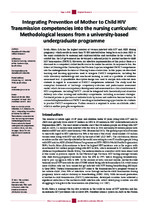Integrating prevention of mother to child HIV transmission competencies into the nursing curriculum: Methodological lessons from a university-based undergraduate programme
Abstract
South Africa (SA) has the highest number of women infected with HIV and AIDS during
pregnancy, which results in more than 70 000 infected babies being born each year AIDS is the major contributor to maternal and child morbidities and mortalities in the country. To combat this, the SA government has developed a national policy to prevent mother-to-child HIV transmission (PMTCT). However, for effective implementation of this policy, there is a dire need for a competent, skilled health worker to render the service. In response to this, the School of Nursing at the University of the Western Cape has integrated PMTCT competencies into the undergraduate Bachelor of Nursing Science curriculum. In this paper, we described teaching and learning approaches used to integrate PMTCT competencies, including the skills laboratory methodology and case-based learning, as well as a portfolio of evidence assessment tool. A quantitative descriptive design was used to analyse data collected from students in regard to assessment of PMTCT competencies achieved. The study used the conceptual framework of Lenburg’s competency outcomes and performance assessment model, which focuses on competency development and assessment in a clinical environment. HIV competencies, including PMTCT, should be integrated both theoretically and at service
delivery into other nursing and midwifery competencies, including assessment strategies. Provincial policies in provision of antiretrovirals by nurses and midwives become barriers to successful implementation of PMTCT, resulting in limited learning opportunities for students to practice PMTCT competencies. Further research is required to assess an attribute, affect, which is another prong for competencies.

